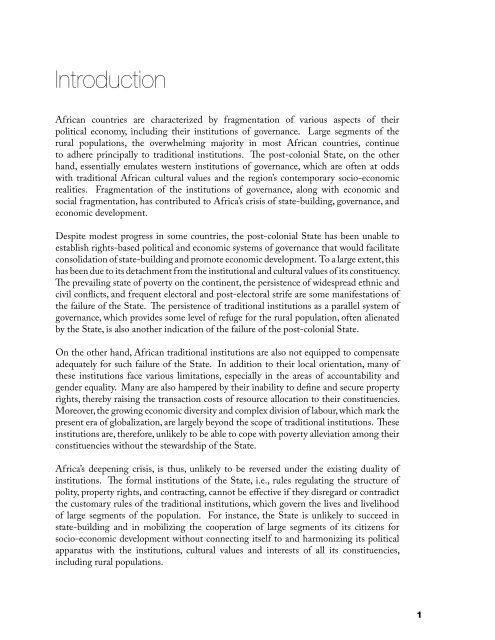Relevance of - United Nations Economic Commission for Africa
Relevance of - United Nations Economic Commission for Africa
Relevance of - United Nations Economic Commission for Africa
You also want an ePaper? Increase the reach of your titles
YUMPU automatically turns print PDFs into web optimized ePapers that Google loves.
Introduction<br />
<strong>Africa</strong>n countries are characterized by fragmentation <strong>of</strong> various aspects <strong>of</strong> their<br />
political economy, including their institutions <strong>of</strong> governance. Large segments <strong>of</strong> the<br />
rural populations, the overwhelming majority in most <strong>Africa</strong>n countries, continue<br />
to adhere principally to traditional institutions. The post-colonial State, on the other<br />
hand, essentially emulates western institutions <strong>of</strong> governance, which are <strong>of</strong>ten at odds<br />
with traditional <strong>Africa</strong>n cultural values and the region’s contemporary socio-economic<br />
realities. Fragmentation <strong>of</strong> the institutions <strong>of</strong> governance, along with economic and<br />
social fragmentation, has contributed to <strong>Africa</strong>’s crisis <strong>of</strong> state-building, governance, and<br />
economic development.<br />
Despite modest progress in some countries, the post-colonial State has been unable to<br />
establish rights-based political and economic systems <strong>of</strong> governance that would facilitate<br />
consolidation <strong>of</strong> state-building and promote economic development. To a large extent, this<br />
has been due to its detachment from the institutional and cultural values <strong>of</strong> its constituency.<br />
The prevailing state <strong>of</strong> poverty on the continent, the persistence <strong>of</strong> widespread ethnic and<br />
civil conflicts, and frequent electoral and post-electoral strife are some manifestations <strong>of</strong><br />
the failure <strong>of</strong> the State. The persistence <strong>of</strong> traditional institutions as a parallel system <strong>of</strong><br />
governance, which provides some level <strong>of</strong> refuge <strong>for</strong> the rural population, <strong>of</strong>ten alienated<br />
by the State, is also another indication <strong>of</strong> the failure <strong>of</strong> the post-colonial State.<br />
On the other hand, <strong>Africa</strong>n traditional institutions are also not equipped to compensate<br />
adequately <strong>for</strong> such failure <strong>of</strong> the State. In addition to their local orientation, many <strong>of</strong><br />
these institutions face various limitations, especially in the areas <strong>of</strong> accountability and<br />
gender equality. Many are also hampered by their inability to define and secure property<br />
rights, thereby raising the transaction costs <strong>of</strong> resource allocation to their constituencies.<br />
Moreover, the growing economic diversity and complex division <strong>of</strong> labour, which mark the<br />
present era <strong>of</strong> globalization, are largely beyond the scope <strong>of</strong> traditional institutions. These<br />
institutions are, there<strong>for</strong>e, unlikely to be able to cope with poverty alleviation among their<br />
constituencies without the stewardship <strong>of</strong> the State.<br />
<strong>Africa</strong>’s deepening crisis, is thus, unlikely to be reversed under the existing duality <strong>of</strong><br />
institutions. The <strong>for</strong>mal institutions <strong>of</strong> the State, i.e., rules regulating the structure <strong>of</strong><br />
polity, property rights, and contracting, cannot be effective if they disregard or contradict<br />
the customary rules <strong>of</strong> the traditional institutions, which govern the lives and livelihood<br />
<strong>of</strong> large segments <strong>of</strong> the population. For instance, the State is unlikely to succeed in<br />
state-building and in mobilizing the cooperation <strong>of</strong> large segments <strong>of</strong> its citizens <strong>for</strong><br />
socio-economic development without connecting itself to and harmonizing its political<br />
apparatus with the institutions, cultural values and interests <strong>of</strong> all its constituencies,<br />
including rural populations.
















